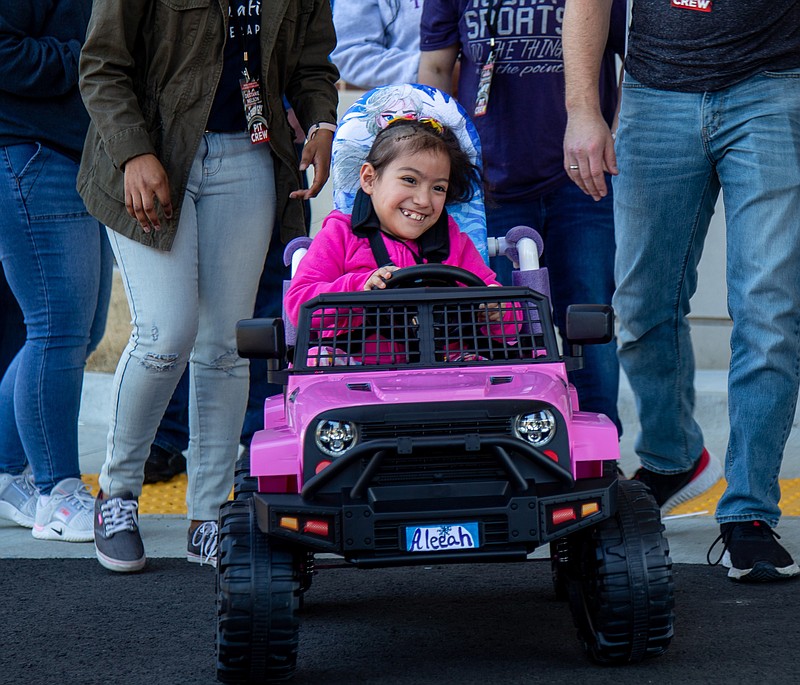CONWAY -- Pool noodles wrapped around PVC pipe and foam kickboards along with black electrical tape and power tools covered half a dozen stations staffed with doctors, students and professors Saturday at the University of Central Arkansas' Integrated Health Science Building.
The university and Arkansas Children's Hospital partnered to host the first Go Baby Go event, where students and a team of experts adapted Jeep ride-on electric toy vehicles to accommodate children with significant mobility impairment.
"This project is important on so many levels," Leah Lowe, associate professor in UCA's department of physical therapy, said. "The students learn the value of working in interprofessional teams; community partnerships are strengthened through collaboration; and, most importantly, these children receive a personalized, modified car that provides them an option for independent mobility. Children learn though independent exploration of their environment. So these cars enhance learning and enjoyment."
Go Baby Go is a national initiative that brings together partners -- like UCA and Arkansas Children's Hospital -- to retrofit the vehicles and give them to special-needs children to allow them to move independently as well as increase their play skills and social interactions.
Each "pit crew" included occupational therapy, physical therapy and speech language pathology students, as well as medical students, electricians, engineers, assistive technology professionals and clinicians from around the state.
"If we can build a car for kids with spina bifida, we can build a car for anybody," Dr. Laura Hobart-Porter, a developmental pediatrician at Arkansas Children's Hospital, said.
Spina bifida is a congenital condition in which the child's spinal cord fails to develop properly. The condition can leave a child unable to walk without assistance, as well as other disabilities.
Hobart-Porter said she first heard of the Go Baby Go program while in a fellowship at the Cincinnati Children's Hospital Medical Center in Ohio.
The team spent the majority of the day building the adapted vehicles, from assembling the car from the box to building a new wiring system that allows the driver to operate the vehicle from the steering wheel instead of the pedals on the floor of the car.
Katie Kelly, a community physical therapist student, pointed to a red button on the tailgate of the jeep.
"We gave it a kill switch so parents can run after the kids if they need to and hit the switch to stop it," Kelly said.
Cary Yarbrough, an assistive technology professional and branch manager of Action Seating & Mobility in Sherwood, said the project gives children inclusive mobility that they haven't had before.
"They get to play just like other kids, just by adding the controls to the steering wheel," he said.
Kelly pointed to the swimming kick board with colorful dinosaurs then slid it in the space between the padded PVC frame of the seat, creating a higher seat back than the one that came with the original vehicle. Seat belts keeping the child secured were added.
"The kids have a low level of trunk instability and this alternative mobility helps them to sit upright," Kelly said. "The way the U.S. addresses adaptive mobility is different from the rest of the world. Insurance here will not cover things like this, but Canada pays for it. With what we're doing today, you can go to Walmart and get the parts then the kids can be a part of the community, their neighborhood."
Saturday afternoon, the children arrived to test drive their new vehicles so the pit crews could make personalized adjustments if necessary.
Funding for the project began with a $3,000 grant from the UCA Foundation for the purchase of the cars and the initial supplies, Lowe said.
"Our student led donation team brought in a variety of monetary and material donations from businesses and individuals throughout the community," Lowe said.
Lynne Hollaway, a UCA occupational therapist professor, said the planning for the project began in June in partnership with Arkansas Children's Hospital.
"We've always had a great relationship with ACH," Hollaway said. "With this project, they gave us the opportunity to meet our goals as a college of creating interprofessional clinicians. That partnership enhances learning. We're meeting each others needs."
